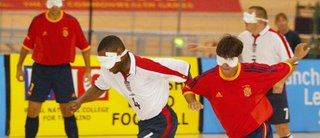 The Blind World Cup kicks off in Argentina tomorrow and the England squad have one vision – to bring home the trophy. Top scorer David Clarke, 36, born with glaucoma, reckons the team have a real shot at victory.
The Blind World Cup kicks off in Argentina tomorrow and the England squad have one vision – to bring home the trophy. Top scorer David Clarke, 36, born with glaucoma, reckons the team have a real shot at victory.He said: “We don’t know who we’re playing yet but we want one of the big teams at the start. We’re as strong now as we have ever been. We’ve got a youthful side and we’ve been training hard.”
David, who plays up front and is a senior partner in a bank, added: “Ranking-wise we’re not top three but we’ve got the ability to win. It all depends on the draw. We’ve got either Brazil or Argentina in our group, which will be a big game. But after the group stages if we get France or someone then we’ve got a very good chance of going all the way.”
Just like the regular World Cup, the blind cup is every four years, with the Blind European Championships two years afterwards. And just like in the regular World Cup, two danger teams are Argentina and Spain.
Alex Stone, of the Football Association, says: “It was Spain that came up with the concept of blind football and they’re the world number one.Hosts Argentina are pretty good as well, so they’re the teams to beat. England are about fifth or sixth in the world so we stand a good chance.”
Making up the ten teams in action are Brazil, Paraguay, France, Japan, Korea, South Korea and Senegal. The England squad have been in Argentina getting used to the 25°C heat to be in top form for their opening game on Thursday.
When in the UK they train together once a month — but have been honing their bodies and skills every weekend for the past two months. The England team is funded by the FA and works to promote disability in sports.
Many players are all-round top performers. Alex Stone says: “One of our key players, Darren Harris, competes in judo and athletics to a high standard. And Keryn Seal plays for the blind England cricket squad. A lot of the lads in Argentina now are looking to compete in the Paralympics in Beijing in 2008.”
The Rules
- The football is smaller than a normal ball. It is filled with ball bearings so players can hear it.
- Games are five-a-side and teams can use five subs.
- The crowd must be silent so players can hear where the ball is – but they can celebrate goals.
- Players shout out when they want the ball passed to them.
- A coach sits behind each goal and shouts so players know where to shoot.
- All outfield players must be category B1 blind – completely blind – but still wear blindfolds. This follows a tournament where one player was partially sighted and kept scoring. The players are checked by an ophthalmologist at the start of every tournament.
- Goalkeepers are sighted and not allowed out of their areas.
- There are walls around the outside of the pitch so the ball is always in play.
- Each half is 25 minutes.
- There is no offside.
No comments:
Post a Comment